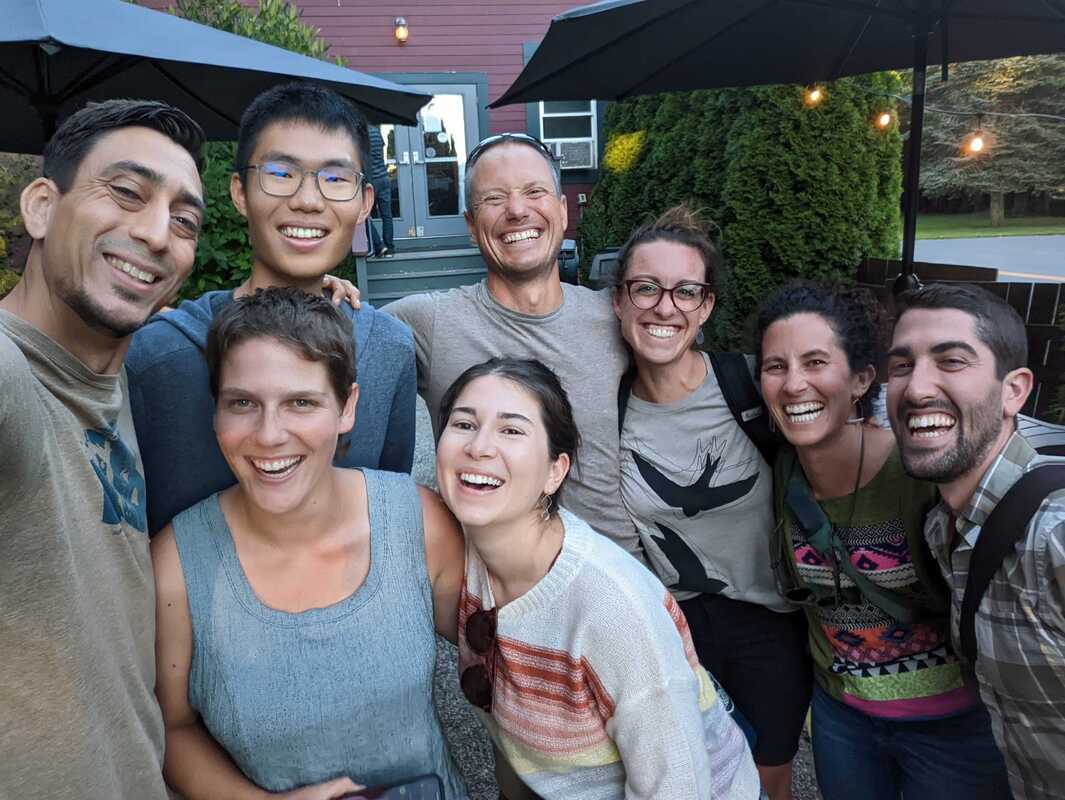Senner and Stager Lab Gathering.
(L:R) Julian Garcia-Walther, Feipeng Huang, Rozy Bathrick, Nathan Senner, Lauren Puleo, Maria Stager, Maina Handmaker, and Cory Elowe. (Not pictured: Jenny Linscott and Fernando Faria)
(L:R) Julian Garcia-Walther, Feipeng Huang, Rozy Bathrick, Nathan Senner, Lauren Puleo, Maria Stager, Maina Handmaker, and Cory Elowe. (Not pictured: Jenny Linscott and Fernando Faria)
|
Nathan Senner, Assistant Professor
Nathan started studying birds at the age of 14. After earning a B.A. from Carleton College, he was awarded a Thomas J. Watson Fellowship to follow Hudsonian Godwits on their annual migration from the Arctic to the southern tip of South America and back. He continued this research while pursuing his PhD at Cornell University with Dr. John Fitzpatrick. From there, he traveled across the Atlantic for a postdoc with Dr. Theunis Piersma at the University of Groningen studying the flexibility of Black-tailed Godwit annual cycles. Following that, he was a postdoc at the University of Montana with Dr. Zachary Cheviron investigating the population dynamics of high-elevation deer mice. In his free time, Nathan trains with his running partner, Oliver (three-time canine champion of the Snow Joke Half Marathon and inarguably Montana's fastest dog). |
Graduate Students:
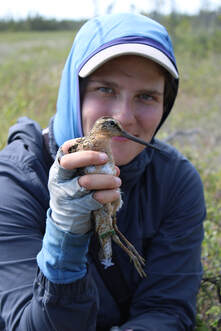
Rozy Bathrick, PhD Student
Rozy hails from the foggy coast of central California, where she graduated with a B.A. in Environmental Studies from the University of California Santa Cruz. After graduating, Rozy worked as an assistant to field ecology courses for undergraduate students and as a project leader on a seabird colony for Oikonos Ecosystem Knowledge. For her PhD research, Rozy is tracking the fall migration of shorebird species in three genera: Pluvialis (golden-plovers), Limnodromus (dowitchers), and Tringa (yellowlegs). Different breeding latitudes, migratory routes, stopover strategies, and wintering destinations influence the success of these vulnerable populations, and Rozy hopes to understand some of these complex distinctions as well as inform conservation efforts.
Rozy hails from the foggy coast of central California, where she graduated with a B.A. in Environmental Studies from the University of California Santa Cruz. After graduating, Rozy worked as an assistant to field ecology courses for undergraduate students and as a project leader on a seabird colony for Oikonos Ecosystem Knowledge. For her PhD research, Rozy is tracking the fall migration of shorebird species in three genera: Pluvialis (golden-plovers), Limnodromus (dowitchers), and Tringa (yellowlegs). Different breeding latitudes, migratory routes, stopover strategies, and wintering destinations influence the success of these vulnerable populations, and Rozy hopes to understand some of these complex distinctions as well as inform conservation efforts.
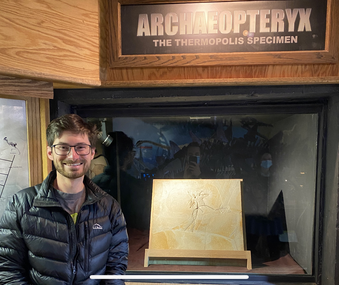
Paul Dougherty, Post-Doctoral Fellow
Paul received his B.A. in Biology and Classics from Colby College and his PhD from the University of Wyoming, where he worked with Matt Carling. His graduate work explored how adaptive variation in molting strategies contributes to reproductive isolation and speciation in birds. He also studied how ongoing shifts in the North American monsoon are influencing bird populations that have evolved to molt in the monsoonal region. Having come to see molt as the most interesting thing that birds do, he is now studying the environmental and genetic regulatory mechanisms of molt, using Lazuli Buntings as a model. He hopes that this research will enable us to begin incorporating molt into management strategies.
Paul is supported by an NSF Post-Doctoral Research Fellowship in Biology.
Check out Paul's personal webpage!
Paul received his B.A. in Biology and Classics from Colby College and his PhD from the University of Wyoming, where he worked with Matt Carling. His graduate work explored how adaptive variation in molting strategies contributes to reproductive isolation and speciation in birds. He also studied how ongoing shifts in the North American monsoon are influencing bird populations that have evolved to molt in the monsoonal region. Having come to see molt as the most interesting thing that birds do, he is now studying the environmental and genetic regulatory mechanisms of molt, using Lazuli Buntings as a model. He hopes that this research will enable us to begin incorporating molt into management strategies.
Paul is supported by an NSF Post-Doctoral Research Fellowship in Biology.
Check out Paul's personal webpage!
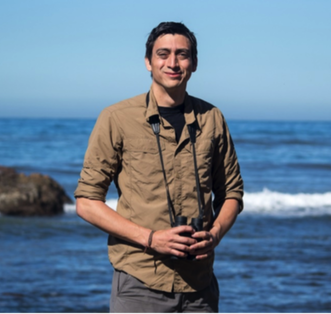
Julián Garcia-Walther, PhD Student
Julián earned a B.S. in Biology from the Universidad Autónoma de Baja California, Mexico and an MSc. in International Nature Conservation from Gottingen University in Germany and Lincoln University in New Zealand. As a part of his MSc. work, he authored the Atlas de las aves playeras de Chile. For his PhD, Julián is studying the little-known shorebird Calidris canutus roselaari, the rarest of all Red Knot subspecies. Every year, roselaari Red Knots spend the winter on the warm coasts of western Mexico then migrate thousands of kilometers to breed on Wrangel Island, Russia and in Western Alaska. Climate change is causing the Arctic to warm faster than any other region of the planet and Julian will investigate how these changes are influencing the development and survival of young knots.
Julian is supported by a CONACYT Fellowship from the Government of Mexico.
Julian's ResearchGate Profile
Julián earned a B.S. in Biology from the Universidad Autónoma de Baja California, Mexico and an MSc. in International Nature Conservation from Gottingen University in Germany and Lincoln University in New Zealand. As a part of his MSc. work, he authored the Atlas de las aves playeras de Chile. For his PhD, Julián is studying the little-known shorebird Calidris canutus roselaari, the rarest of all Red Knot subspecies. Every year, roselaari Red Knots spend the winter on the warm coasts of western Mexico then migrate thousands of kilometers to breed on Wrangel Island, Russia and in Western Alaska. Climate change is causing the Arctic to warm faster than any other region of the planet and Julian will investigate how these changes are influencing the development and survival of young knots.
Julian is supported by a CONACYT Fellowship from the Government of Mexico.
Julian's ResearchGate Profile
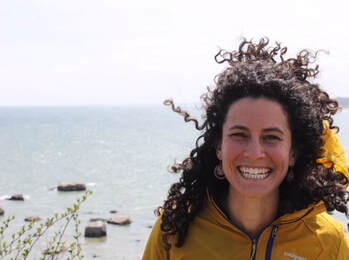
Maina Handmaker, PhD Student
Maina earned her B.A. in Environmental Studies and Visual Arts from Bowdoin College. She joined the Senner Lab from the Manomet Shorebird Recovery Program team, where she worked as the Communications Specialist for the Western Hemisphere Shorebird Reserve Network (WHSRN). For her PhD research, Maina is studying the role nocturnal roost sites play in the stopover ecology and migratory performance of Atlantic flyway Whimbrel. By tracking Whimbrel movements during and after their spring stopover on the coast of South Carolina, she is investigating how individuals select foraging and roosting sites and working to better understand how those choices influence their entire annual cycle. Maina hopes this new information about Whimbrel migratory behavior can inform targeted conservation action to help turn the tide for this declining species.
Maina is supported by an NSF Graduate Research Fellowship.
Check out Maina's Personal Webpage and Whimbrel story map!
Maina earned her B.A. in Environmental Studies and Visual Arts from Bowdoin College. She joined the Senner Lab from the Manomet Shorebird Recovery Program team, where she worked as the Communications Specialist for the Western Hemisphere Shorebird Reserve Network (WHSRN). For her PhD research, Maina is studying the role nocturnal roost sites play in the stopover ecology and migratory performance of Atlantic flyway Whimbrel. By tracking Whimbrel movements during and after their spring stopover on the coast of South Carolina, she is investigating how individuals select foraging and roosting sites and working to better understand how those choices influence their entire annual cycle. Maina hopes this new information about Whimbrel migratory behavior can inform targeted conservation action to help turn the tide for this declining species.
Maina is supported by an NSF Graduate Research Fellowship.
Check out Maina's Personal Webpage and Whimbrel story map!
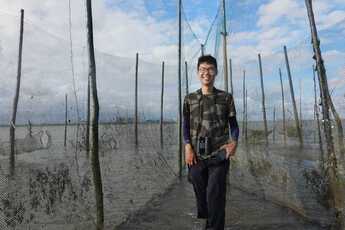
Feipeng Huang, MSc Student
Feipeng was born and raised in eastern China along the coast of the Yellow Sea. There he watched shorebirds use the region's shrinking wetlands and found his passion for birds and conservation. He has also led citizen-based raptor migration counts in southwest China and helped monitor the by-catch mortality of shorebirds across China’s coast. In 2022, Feipeng received his B.S. in Wildlife, Fish, and Conservation Biology from UC Davis. For his MSc. research, he hopes to understand how Hudsonian Godwit chicks respond to a dynamic landscape of resource availability and predation risk under environmental change.
Feipeng was born and raised in eastern China along the coast of the Yellow Sea. There he watched shorebirds use the region's shrinking wetlands and found his passion for birds and conservation. He has also led citizen-based raptor migration counts in southwest China and helped monitor the by-catch mortality of shorebirds across China’s coast. In 2022, Feipeng received his B.S. in Wildlife, Fish, and Conservation Biology from UC Davis. For his MSc. research, he hopes to understand how Hudsonian Godwit chicks respond to a dynamic landscape of resource availability and predation risk under environmental change.

Jenny Linscott, PhD Student
Before becoming a biologist, Jenny received a B.A. in English from Hendrix College and an M.F.A. in Creative Writing from the University of Mississippi. She was a Science Reporting Intern at Louisiana State University, where she interviewed researchers in the field. Now Jenny's PhD research is focused on the migration of Hudsonian Godwits through mid-continental North America. She is hoping to understand how habitat quality and abiotic conditions during migration affect godwit stopover behavior, migratory performance, and reproductive success.
Jenny won the Wesley Lanyon Award from the American Ornithological Society in 2021. She is supported by a NASA Finesst Fellowship in Biological Diversity and Ecological Forecasting.
Before becoming a biologist, Jenny received a B.A. in English from Hendrix College and an M.F.A. in Creative Writing from the University of Mississippi. She was a Science Reporting Intern at Louisiana State University, where she interviewed researchers in the field. Now Jenny's PhD research is focused on the migration of Hudsonian Godwits through mid-continental North America. She is hoping to understand how habitat quality and abiotic conditions during migration affect godwit stopover behavior, migratory performance, and reproductive success.
Jenny won the Wesley Lanyon Award from the American Ornithological Society in 2021. She is supported by a NASA Finesst Fellowship in Biological Diversity and Ecological Forecasting.
Lab Graduates:
- Matt Duggan, BSc 2022 from the University of South Carolina, now a PhD student at Cornell University
- Fernando Faria, PhD 2023 from the Universidade Federal do Rio Grande
- Sara Padula, BSc 2022 from the University of South Carolina, now a PhD Student at the University of Colorado, Boulder
- Maggie Pelton, BSc 2022 from the University of South Carolina, now a researcher at the Baruch Marine Institute
- Lauren Puleo, MSc 2024 from the University of Massachusetts Amhert, now an environmental educator in Fairbanks, AK.
- Rose Swift, PhD 2018 from Cornell University, coadvised with Amanda Rodewald, now a researcher with USGS
- Mo Verhoeven, PhD 2020 from the University of Groningen, coadvised with Theunis Piersma, now a postdoc at NIOO-KNAW
- Luke Wilde, MSc 2021 from the University of South Carolina, now a PhD student at the University of Wyoming
Collaborators:
- Fernando Angulo-Pratalongo, Centro de Ornitología y Biodiversidad
- Zachary Cheviron, University of Montana
- Jorge Gutiérrez, Universidad de Extremadura
- Jose Masero, Universidad de Extremadura
- Johnnie Moore, University of Montana
- Juan Navedo, Universidad Austral de Chile
- Erica Nol, Trent University
- Theunis Piersma, Rijksuniversiteit Groningen
- Felicia Sanders, South Carolina Department of Natural Resources
- Maria Stager, University of Massachusetts Amherst
- Jonathan Velotta, University of Denver
